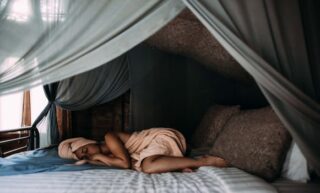
More Sleep Articles
The Sleep-Inducing Effects of Alcohol: Understanding Why Drinking Makes You Feel Tired

Have you ever found yourself asking, “why does drinking make me sleepy?” You’re not alone. It’s a question many people ponder after a few drinks leave them feeling drowsy and eager for bed. This article will delve into the reasons behind this common experience, exploring the effects of alcohol on sleep and the body. Understanding these effects can help inform safer drinking habits and improve overall well-being.
Why Does Drinking Make Me Sleepy?
Alcohol is a central nervous system depressant, which means it has calming effects on the body. When you drink, alcohol can slow down brain activity and cause a sense of relaxation and drowsiness. This neurological effect is one reason why drinking may make you feel tired. Additionally, alcohol can decrease the amount of rapid eye movement (REM) sleep you experience, which may leave you feeling less rested.
The Science Behind Alcohol and Sleep
On a physiological level, alcohol increases the production of the neurotransmitter gamma-aminobutyric acid (GABA). GABA is responsible for inhibiting nerve transmission in the brain, leading to a sedative effect. While this can help you fall asleep faster, it also contributes to disrupted sleep patterns. Studies have shown that alcohol consumption can interfere with the important sleep cycles necessary for a restful night.
Short-Term Effects of Alcohol on Sleep
In the short term, alcohol can seem like a quick fix for sleeplessness. It may help you drift off faster, but this effect is misleading. Alcohol consumption can lead to frequent awakenings during the night and reduced sleep quality. You might wake up feeling groggy, with a lingering sense of fatigue that alcohol purportedly alleviated the night before. Furthermore, alcohol-induced sleep is usually lighter and less restorative, as it suppresses REM sleep, a critical phase for cognitive functions like memory and mood regulation.
Long-Term Consequences of Alcohol on Sleep
Regular use of alcohol as a sleep aid can lead to a myriad of issues. Chronic consumption may contribute to the development of sleep disorders, including insomnia and sleep apnea. Additionally, continued alcohol use can alter the body’s natural sleep architecture, making it more challenging to achieve restful sleep even when you’re sober. Frequent reliance on alcohol for sleep can also cultivate dependency and exacerbate mental health issues such as anxiety and depression.
Balancing Alcohol Consumption
Maintaining a healthy relationship with alcohol involves understanding its effects and limits. If you’re using alcohol to fall asleep, it may be beneficial to explore alternative strategies that support natural sleep cycles. Consider practices such as maintaining a consistent bedtime, creating a relaxing nighttime routine, or engaging in mindfulness exercises. These strategies may promote more sustainable and restorative sleep patterns compared to the temporary relief provided by alcohol.
Read more on how to manage alcohol consumption effectively in our article on understanding drug and alcohol addiction.
Other Factors Influencing Sleepiness When Drinking
It’s important to note that alcohol may interact with other substances or medications, potentially amplifying its sedative effects. Combining alcohol with sleep-inducing or anti-anxiety medications can be particularly dangerous, leading to heightened drowsiness or extreme sedation. This interaction underscores the need for caution and consultation with healthcare professionals when mixing alcohol with any prescription or over-the-counter medication.
Takeaways
- Alcohol is a central nervous system depressant that can induce sleepiness by slowing brain activity.
- Despite making you fall asleep faster, alcohol typically disrupts restful sleep and alters sleep cycles.
- Regular reliance on alcohol for sleep can lead to long-term sleep issues and dependency.
- Alternative sleep-enhancing practices may offer more sustainable results than alcohol.
- Always consult a healthcare provider when combining alcohol with medications.
FAQs
Why does drinking make me feel sleepy even after just one glass?
The sedative effect of alcohol can vary from person to person, but even a small amount can increase GABA activity, creating a sense of relaxation and drowsiness.
Will drinking alcohol help cure my insomnia?
While alcohol can help you fall asleep initially, it is not a cure for insomnia. It disrupts sleep quality and long-term use can worsen sleep issues.
Is it safe to drink alcohol if I’m on sleep medication?
Mixing alcohol with sleep medication is generally unsafe, as it can amplify sedative effects. Always consult a healthcare provider for personalized advice.
Are there healthier alternatives to alcohol for improving sleep?
Yes, healthier alternatives include maintaining a sleep schedule, creating a bedtime routine, and practicing mindfulness or meditation.
Where can I find more detailed information on the impacts of alcohol on health?
For more information, check out this comprehensive resource on alcohol’s health impacts at Wikipedia on Health.
In conclusion, understanding why does drinking make me sleepy is key to mitigating its impact on your sleep health. By learning the interactions of alcohol within your body, you can make informed choices to support both healthier drinking habits and better sleep.
Other Articles You May Find of Interest...
- Is UARS Affecting Your Sleep Quality and Health?
- Sleep Apnea and TMJ Treatment: Why Your Aching Jaw Might Be Stealing Your Sleep
- Discovering the Mechanism of Inspire Therapy for Sleep Apnea
- Sleep Regressions: How Long Do They Last and What to Expect?
- The Hidden Risks of Sleeping with Your Feet Elevated
- Take Control of Your Sleep Health Today With Smarter, Science-Backed Solutions
- Melatonin vs Ambien: Which Sleep Aid is Right for You?














